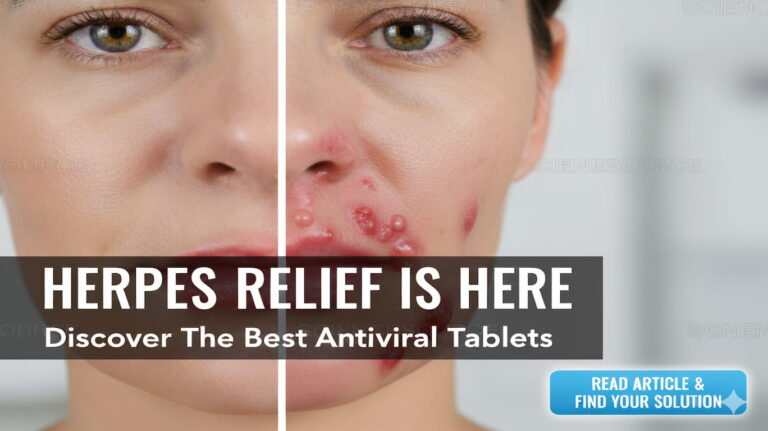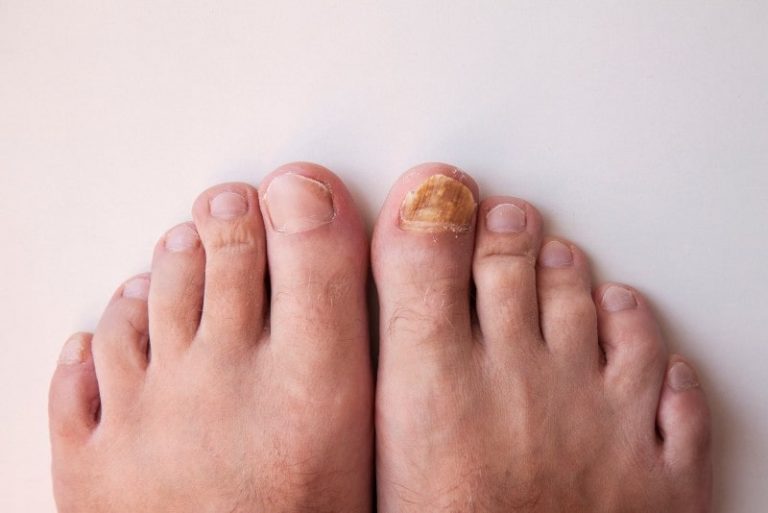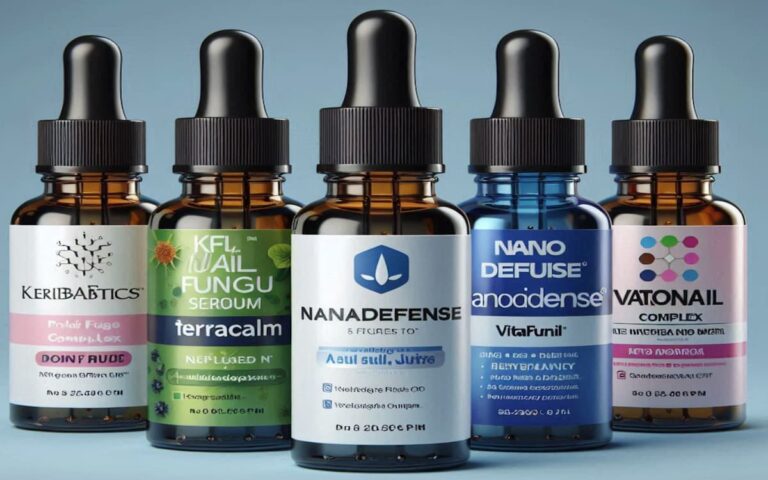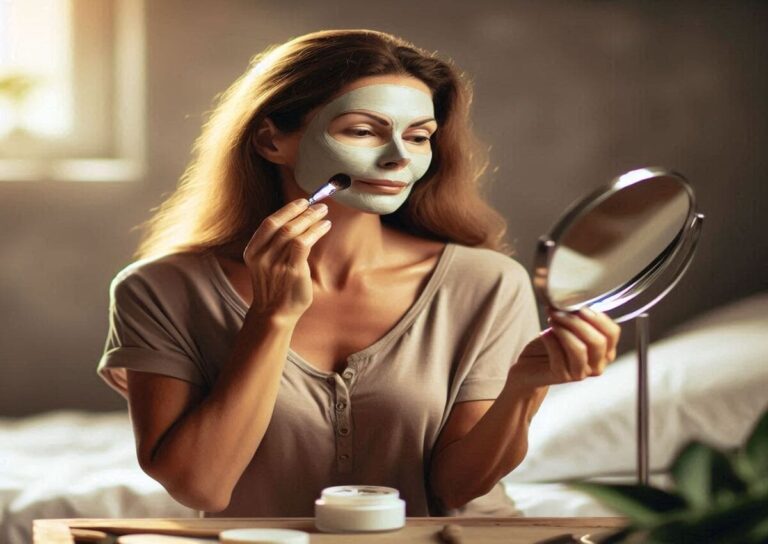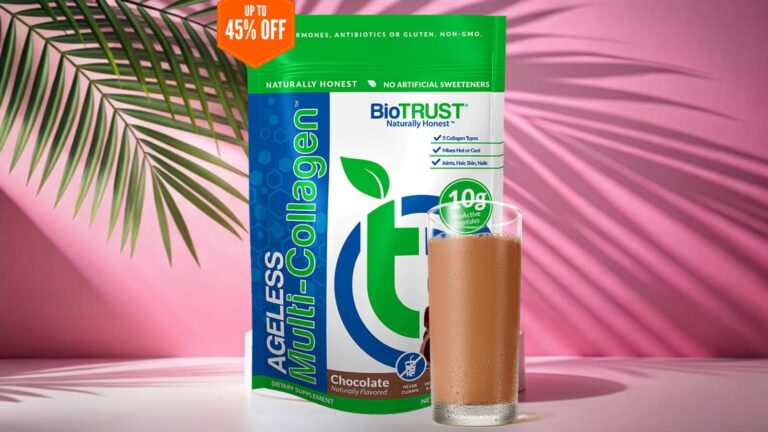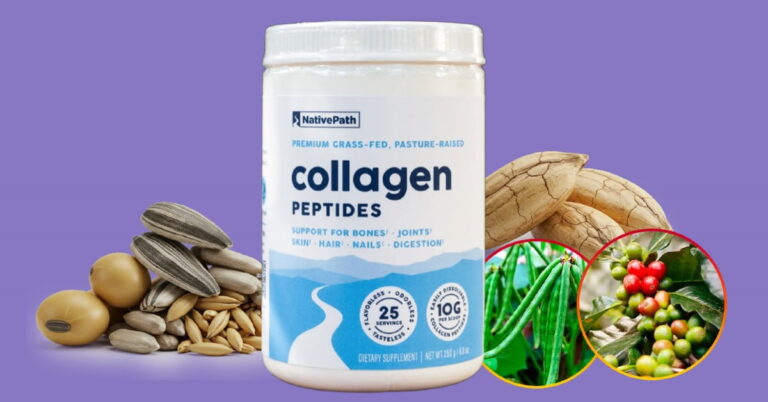Best Way to Get Rid of a Cold Sore Fast Remedy That Work – The Ultimate Guide
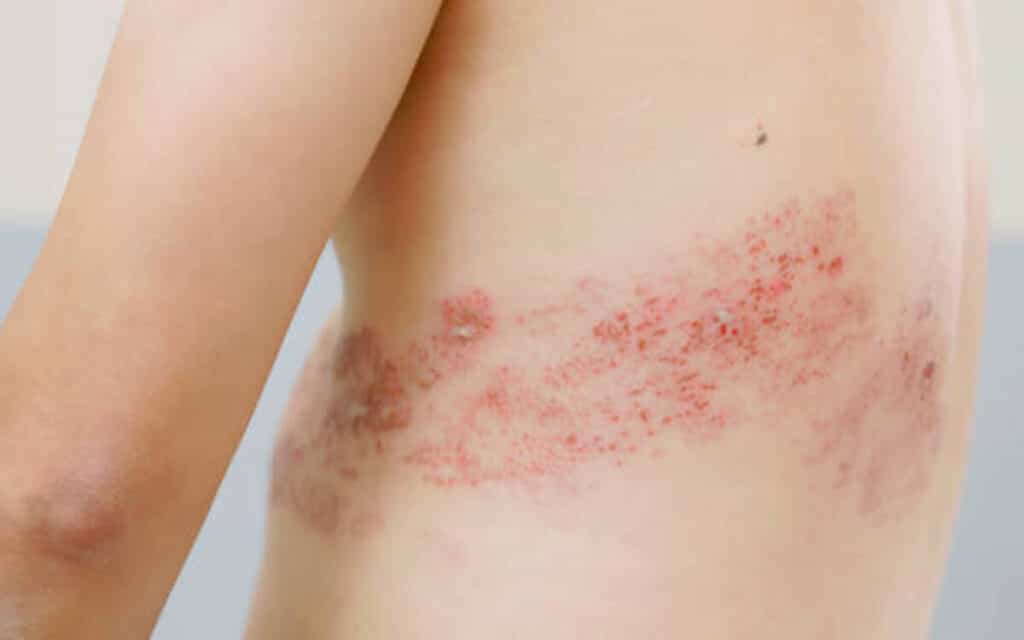
A sudden tingling sensation at the edge of your lip, quickly followed by the unmistakable blistering flare-up the threatening signs of a cold sore, an unwelcome visitor that can disrupt your day, cause discomfort, and steal your confidence.
These tiny yet tormenting sores, caused by the herpes simplex virus that causes cold sores, often appear at the most inconvenient times, leaving you scrambling for solutions.
However, fear not, as amidst this frustrating ordeal, there exists a range of effective methods and remedies to not only alleviate the discomfort but also hasten the departure of these pesky intruders.
In this guide on the Best way to get rid of a cold sore Fast, we’ll unveil the best strategies and remedies, empowering you to bid farewell to cold sores and reclaim your comfort and confidence swiftly and effectively.
Have you ever woken up to find those painful blisters around your lips that make you want to hide indoors? Chances are you are experiencing a cold-sore outbreak.
Cold sores, also known as fever blisters, are small painful blisters that occur on the lips, chin, cheeks, inside the nose, or around the mouth. They are caused by the herpes simplex virus and are highly contagious.
While cold sores tend to heal on their own within 2-4 weeks, they can be painful, uncomfortable, and embarrassing during an outbreak.
The stigma associated with cold sores also causes psychological distress among those suffering from recurrent episodes.
This ultimate guide covers everything you need to know about getting rid of cold sores fast and effectively to help you manage outbreaks better.
Understanding Cold Sores
Cold sores, also known as fever blisters, are small, painful, fluid-filled blisters that typically appear on or around the lips.
They are caused by the herpes simplex virus (HSV-1), although in some cases, herpes simplex virus type 2 (HSV-2) can also lead to oral herpes.
In most cases, cold sores around the mouth are caused by HSV-1 while HSV-2 triggers genital herpes outbreaks. However, HSV-1 can also cause genital herpes and vice versa.
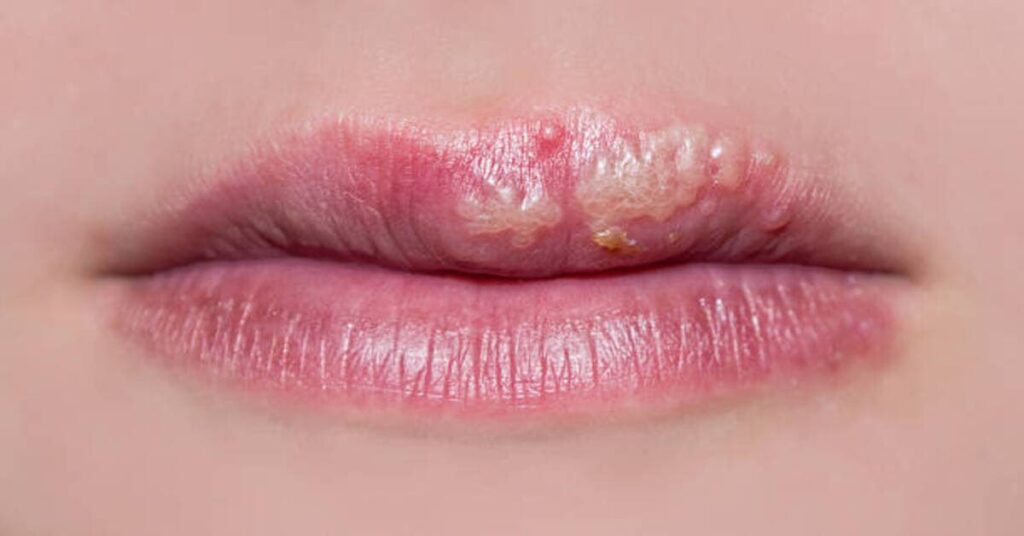
What Causes Cold Sores
- Herpes Simplex Virus (HSV): The primary cause of cold sores is the herpes simplex virus, which is highly contagious and easily transmitted through direct contact with an infected person or their saliva.
- Triggers: Certain factors can activate the herpes virus, leading to the development of cold sores. Common triggers include stress, fatigue, fever, hormonal changes, exposure to sunlight, and weakened immune function.
- Initial exposure to HSV-1 typically occurs in childhood through contact with infected saliva.
- The virus then lies dormant in nerve tissues and reactivates later, causing recurrent cold sore outbreaks.
- Common triggers leading to reactivation include stress, fatigue, hormone changes, sunlight, menstrual periods, fever, and skin trauma.
How Cold Sores Develop and Spread
Cold sores are caused by any of the factors below:
- Initial Infection: The initial exposure to the herpes simplex virus often occurs during childhood, but the virus can remain dormant in the body for years without causing symptoms.
- Outbreaks: Periodically, the virus can reactivate due to triggers, causing a recurrence of cold sores.
- Symptoms: Cold sores typically start with a tingling or burning sensation, followed by the appearance of small, fluid-filled blisters. These blisters can break open, releasing fluid and forming a crust before healing.
- Prodromal symptoms like itching, burning, and tingling may precede a cold sore outbreak by 12-24 hours.
- Fluid-filled blisters then erupt, usually on or around the lips. These blisters may burst open, weep a clear fluid, and develop into a crusty sore.
- The virus spreads through contact with infected fluid from the cold sore blisters.
- While contagious, avoid direct skin contact and share food, drinks, or utensils with others.
Best Ways to Get Rid of a Cold Sore Fast – The Treatments That Works
Below are the best strategies and remedies, empowering you to bid farewell to cold sores and reclaim your comfort and confidence swiftly and effectively.
Cold Sores Treatment
When that first tingle strikes signaling an impending cold sore outbreak, you can treat cold sores promptly reduce severity, and hasten healing.
Topical antiviral creams containing penciclovir or acyclovir (Abreva, Releev) offer the best over-the-counter option when applied 3-5 times daily at first signs of prodrome.
The prescription antiviral pills Valtrex, Famvir, and Aciclovir also shorten healing time if started early.
Home remedies like aloe vera gel, lemon balm extracts, and ice packs soothe symptoms and limit the size of blisters.
Avoiding triggers like sun exposure, and skin trauma near the mouth along with stress management techniques further help reduce recurrences.
Natural Herpes Remedies
While no cure exists for the underlying herpes simplex virus infection, certain natural remedies can relieve discomfort during outbreaks of cold sores or genital herpes:
- Lemon balm cream – Antiviral properties speed healing
- Licorice root cream – Soothes itching and irritation
- Witch hazel compress – Eases swelling and pain
- Tea tree oil – Helps dry out blisters
- Aloe vera gel – Reduces inflammation
- Coconut oil – Provides moisture to prevent cracking
- Ice packs – Alleviates pain and swelling
Using supplements like l-lysine, vitamin C, zinc, and oregano oil may potentially help reduce recurrences.
Genital Herpes Treatments
Current medical treatments for genital herpes target managing outbreaks, preventing recurrences, and reducing transmission risk.
When genital blisters erupt, starting antiviral tablets like Valacyclovir, Famciclovir or Aciclovir for 5-10 days halts viral replication and speeds healing.
Between outbreaks, taking daily suppressive therapy helps prevent recurrences. Condom use further decreases the shedding of the virus.
Home remedy options include sitz baths, ice packs, aloe vera, and comfrey compresses to ease discomfort. Wearing loose cotton underwear and avoiding friction against lesions while they heal is important.
Genital Herpes Remedies
The below at-home interventions can provide soothing relief during painful genital herpes outbreaks:
- Sitz baths in warm water help ease itching and discomfort
- Ice pack wrapped in towel alleviates swelling when applied to sores
- Aloe vera gel and cocoa butter provide moisture to facilitate healing
- Comfrey root compress reduces inflammation
- Loose cotton underwear prevents friction against sensitive lesions
- Over-the-counter pain medications like ibuprofen help relieve nerve pain
Avoiding triggers like stress, fatigue, and illnesses can help reduce recurrent outbreaks.
Medication for Herpes
For recurring cold sores or genital herpes outbreaks, doctors often prescribe stronger antiviral medications for treatment:
Oral antiviral pills– Valacyclovir, famciclovir and acyclovir halt replication of the herpes virus to speed healing of an eruption by 1-2 days
Topical antiviral creams– Prescription topical penciclovir (Denavir) and acyclovir (Zovirax) creams boost local treatment, especially for oral herpes
Suppressive antiviral therapy taken daily prevents outbreaks in people suffering more than 6 recurrent episodes of cold sores or genital herpes annually
Herpes Virus Treatment
As there is presently no cure for the underlying herpes simplex virus infection, treatment aims at shortening the duration of eruptions and preventing recurrences.
Antiviral medications like Valtrex, Famvir, and topical Zovirax stifle virus replication to help blisters heal 1-2 days faster while reducing pain and shedding.
Treatments and home remedies provide localized soothing relief – ice packs reduce swelling while aloe vera, lemon balm, and licorice root ease inflammation.
Avoiding potential triggers like emotional stress, fever, UV exposure, and skin irritation limits outbreak recurrence.
Taking daily suppressive antiviral therapy also curtails frequency for sufferers experiencing over 6 outbreaks annually for effective treatment of herpes simplex labialis.
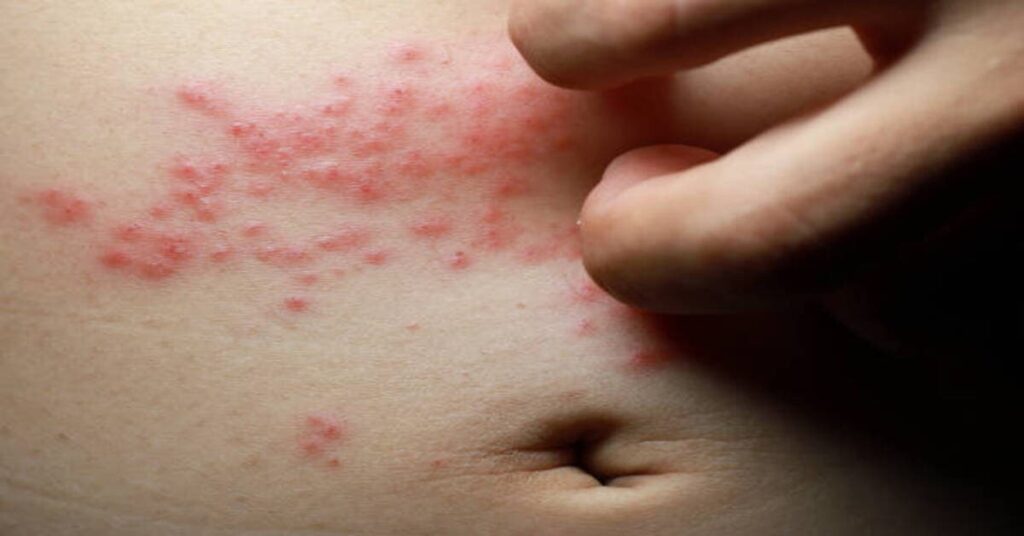
Side Effects of Herpes
While herpes infections often cause only periodic blister eruptions, potential complications in some people can rarely be severe.
Immunocompromised patients risk disseminated herpes marked by widespread virus spread causing organ damage which can be fatal without prompt treatment.
Very rarely, herpes infections (especially HSV-2) can get transmitted from mother to baby during childbirth leading to neonatal herpes which can damage the baby’s brain and other organs.
Another infrequent complication is herpetic whitlow where finger/hand infections result in painful fingernail loss.
Seeking medical help right away on observing any unusual symptoms beyond a typical outbreak is advised.
Herpes Simplex Cold Sores
Also called fever blisters, herpes simplex cold sores result from the reactivation of the dormant oral herpes virus in people previously exposed to HSV-1.
Recurrent outbreaks manifest as crops of itchy, burning blisters around the mouth healing in 2-4 weeks. Triggers leading to eruption flare-ups include stress, fatigue, hormone changes, sunlight exposure, skin trauma, and certain foods.
Antiviral tablets like valacyclovir and topical penciclovir creams shorten healing duration. Natural cold sore remedies using aloe, lemon balm, tea tree oil, and ice packs soothe discomfort during outbreaks.
Avoiding contributing lifestyle factors like UV exposure and stress helps reduce recurrence risk as does taking daily suppressive antiviral therapy for sufferers experiencing over 6 outbreaks annually.
Factors Triggering Outbreaks
Monitor the following triggers closely to detect patterns and avoid recurrences:
- Stress, emotional upset, fatigue: Emotional or physical stress can weaken the immune system, making individuals more susceptible to cold sore outbreaks.
- Sun Exposure: Overexposure to sunlight, especially on the lips, can trigger cold sore outbreaks in some individuals.
- Illness or Fatigue: Conditions that compromise the immune system, such as illness or fatigue, can lead to cold sore flare-ups.
- Hormonal Changes: Hormonal fluctuations, often experienced during menstruation or pregnancy, can trigger cold sore outbreaks in some people.
- Fever, illness
- Hormonal changes
- Skin irritation, trauma (cosmetic procedures, dental work)
- Certain foods (chocolate, nuts, grains)
Preventing Cold Sore Outbreaks
While currently there is no cure for the herpes simplex virus type 1 infection, the below prevention tips can help reduce outbreaks:
Avoid Triggers That Induce Outbreaks
- Stress management through yoga, meditation, counseling
- Treating illnesses promptly to avoid fever
- Using SPF lip balm when going out in the sun
- Avoiding skin procedures like waxing or dermabrasion around lips/mouth
- Saying no to sharing drinks or lip products with others
Lifestyle Changes for Prevention
- Get adequate sleep (at least 8 hours)
- Quit smoking which suppresses the immune response
- Limit alcohol which causes dehydration and triggers outbreaks
- Follow a balanced, nutrient-rich diet with foods containing L-lysine, zinc, vitamin C, and B-complex vitamins
Suppressive Therapy
For frequent recurrences (6+ outbreaks annually), antiviral medications can be taken daily as suppressive therapy to reduce outbreaks.
Over-the-Counter Treatments That Help Get Rid of Cold Sores Fast
Using FDA-approved over-the-counter topical creams and patches at the first sign of tingles can minimize the severity of cold sore outbreaks.
Topical Antiviral Creams
Over-the-counter topical antiviral creams containing acyclovir or penciclovir help shorten healing time by ~18 hours when applied at the first sign of an outbreak. Common brand names include:
- Abreva
- Relief
- Viroxyn
- Lypsyl Cold Sore
Apply the cream on clean, dry skin 5 times a day till the episode resolves. Wash hands after application.
Medicated Cold Sore Patches
Medicated patches with hydrocolloid polymers provide a protective barrier while delivering active ingredients like benzalkonium chloride (antiseptic), menthol, and camphor (local anesthetics).
They help reduce pain and shorten healing time.
Popular OTC patch brands include Zilactin, Compeed Invisible Cold Sore Patch, and Herpecin L. Follow instructions for application as soon as prodromal symptoms manifest or a blister erupts.
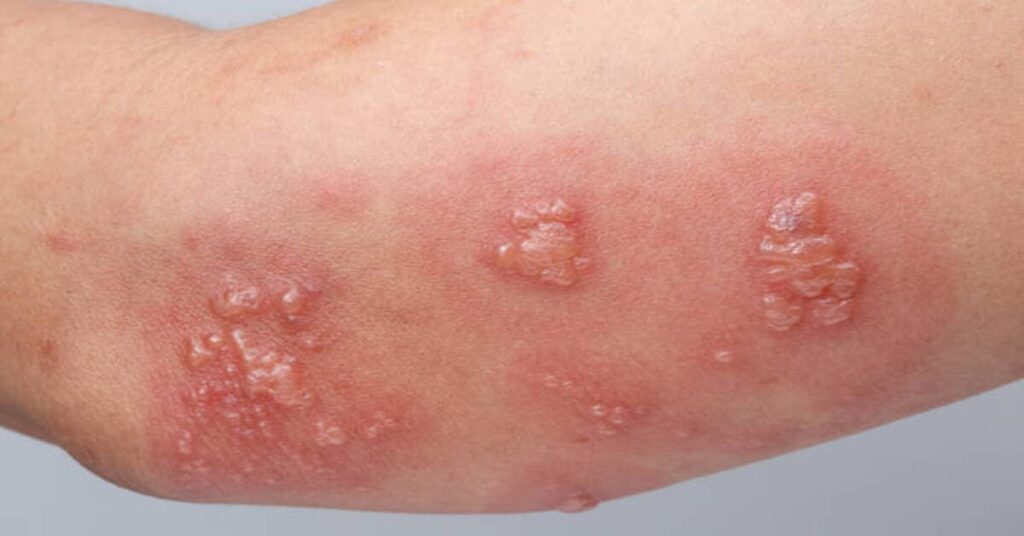
Home Remedies and Natural Ways to Treat Cold Sores
While lacking extensive research, certain at-home and natural DIY treatments are believed to help manage cold sore symptoms. Always do a patch test before trying a new remedy to rule out any allergic reactions.
Ice Packs
Applying an ice pack wrapped in cloth intermittently on blisters can temporarily provide numbing relief from pain and itchiness. Do not apply ice directly without a barrier.
Aloe Vera Gel
The anti-inflammatory properties of aloe vera gel derived from the aloe plant may help reduce inflammation and facilitate the healing of cold sores. Apply liberally on sores using a clean swab or cotton ball.
Tea Tree Oil
The antiviral and antiseptic benefits of tea tree oil may help dry out cold sores while reducing the risk of secondary infections. Mix with carrier oil like coconut oil before dabbing on blisters gently using a cotton bud.
Lemon Balm
Lemon balm extract cream containing concentrated lemon balm leaves is believed to have antiviral activity against HSV. Applying lemon balm cream 2-4 times daily may help alleviate symptoms.
Licorice Root
Licorice root extract cream helps reduce redness, swelling, and irritation associated with cold sores due to its anti-inflammatory effects.
Prescription Medications – Antiviral Medication
For severe, persistent cold sore outbreaks, doctors may prescribe stronger prescription antiviral pills or topical creams.
Oral Antiviral Pills
Oral antiviral pills like Valtrex (valacyclovir), Famvir (famciclovir), and Aciclovir (aciclovir) can shorten healing time by 1-2 days when started at first sight of an erupting cold sore.
- Typically prescribed for 5-10 days.
- Come with side effects like headaches, nausea, and dizziness.
Topical Antiviral Creams & Gels
Prescription topical gels containing acyclovir or penciclovir provide stronger formulations compared to OTC creams. They may be prescribed for pain relief if oral medications cannot be tolerated.
Common brands include Zovirax (acyclovir) cream and Denavir (penciclovir) cream to be applied every 2 hours during waking hours.
Lifestyle Changes for Prevention
Making certain long-term lifestyle changes can help minimize triggers and prevent recurrent cold sore outbreaks.
Stress Management
As emotional stress is a common trigger, practicing stress management techniques helps strengthen immunity and prevent outbreaks.
Useful techniques include:
- Mindfulness meditation
- Yoga, breathwork
- Journaling
- Talk therapy, counseling
Balanced Nutrition
Eating a wholesome diet rich in fruits, vegetables, lean proteins, yogurt, and nuts supplies key nutrients that support immune function.
Immunity-boosting foods:
- Citrus fruits (Vitamin C)
- Red peppers (Vitamin C)
- Broccoli, spinach (Vitamins A, C, E)
- Yogurt (Probiotics)
- Almonds, walnuts (Vitamin E)
- Turmeric, ginger, garlic (Antioxidants)
Adequate Sleep
Chronic sleep deprivation and fatigue can activate the dormant herpes virus, triggering outbreaks.
Aim for 7-9 hours of quality sleep daily by:
- Going to bed and waking up at consistent times
- Limiting screen time before bed
- Creating an environment conducive to sleep
When to Seek Medical Help
Consult a doctor or dermatologist if you experience:
- Very painful, swollen blisters causing difficulty eating/drinking
- Cold sores accompanied by high fever
- Sores lasting beyond 2 weeks without improvement
- Recurrent outbreaks more than 6 times annually
- Signs of skin infection – honey-colored crusts, reddened skin, warmth, swelling, drainage
Doctors can swab the blisters to test for the herpes virus and provide appropriate treatment guidance based on test reports.
Tips for Quick Healing and Prevention of Scarring
During an Outbreak:
Do’s
- Use a fresh swab/cotton ball to apply medicine to avoid contamination
- Dab remedies gently using clean hands
- Apply a healing lip balm or petroleum jelly after topical treatments
Don’ts
- Do not try to rupture or pierce the blisters
- Avoid kissing, oral sex, or sharing utensils when sores are visible
- Do not apply makeup over blisters or attempt hair removal procedures
To Prevent Scarring:
- Keep sores moisturized to avoid cracking & bleeding
- Avoid picking at scabs (may cause scarring)
- Apply remedies recommended by your dermatologist
After an Outbreak:
To speed up the healing process:
- Drink plenty of fluids
- Take a lysine supplement daily
- Apply healing balm like aloe vera or vitamin E oil on healed skin
To reduce future outbreaks:
- Take antiviral medications daily as a suppressive therapy (if recommended by doctor)
- Avoid triggers like excessive sunlight, trauma to the skin around the mouth
Conclusion on the Best way to get rid of a cold sore Fast Remedy That Work
In conclusion, managing and alleviating cold sores involves a multifaceted approach—from understanding triggers to employing effective treatments and preventive measures.
While these pesky blisters can be disruptive, armed with the knowledge shared in this guide, you’re empowered to take charge of cold sore outbreaks.
Remember, whether opting for over-the-counter remedies, exploring natural treatments, or seeking medical advice when necessary, there are various strategies available to ease discomfort and hasten the healing process.
By implementing lifestyle changes and quick recovery tips, you can not only bid farewell to cold sores swiftly but also strive towards preventing future outbreaks. Embrace these insights and techniques to reclaim comfort, confidence, and life unhindered by cold sore concerns.
Frequently Asked Questions (FAQs) on Best way to get rid of a cold sore Fast Remedy That Work
1. What exactly is a cold sore?
A cold sore, also known as a fever blister, is a small, painful blister that typically appears on or around the lips. It’s caused by the herpes simplex virus (HSV-1), although HSV-2 can also cause oral herpes. Cold sores are highly contagious and can be transmitted through direct contact with an infected person or their saliva.
2. What causes cold sores to appear?
Cold sores are caused by the herpes simplex virus (HSV). The virus remains dormant in nerve cells until triggered by various factors such as stress, fatigue, fever, sunlight exposure, hormonal changes, or a weakened immune system. When triggered, the virus replicates, leading to the development of cold sores.
3. How can I prevent cold sores from occurring?
Preventing cold sores involves managing triggers and maintaining a healthy lifestyle. Strategies include reducing stress through relaxation techniques, getting enough sleep, avoiding excessive sunlight exposure on the lips, maintaining proper hygiene, and boosting the immune system through a balanced diet and regular exercise.
4. What are the best over-the-counter treatments for cold sores?
Several over-the-counter (OTC) treatments can help alleviate cold sore symptoms. Antiviral creams or ointments containing ingredients like docosanol or acyclovir can shorten healing time and reduce discomfort. Additionally, lip balms containing moisturizing agents can prevent cracking and further irritation.
5. Are there any natural remedies I can try at home?
Several natural remedies can help manage cold sores. These include applying ice packs to reduce swelling, using aloe vera gel to soothe the affected area, applying tea tree oil for its antiviral properties, and using any of these 5 best herpes supplements or foods rich in lysine, such as yogurt and fish, to help prevent outbreaks.
6. Should I consider prescription medications for treating cold sores?
Prescription medications, such as oral antiviral drugs (e.g., acyclovir, valacyclovir, famciclovir), may be recommended for severe or frequent outbreaks. These medications can help shorten the duration of outbreaks and reduce their severity. Consult a healthcare professional for personalized guidance.
7. What lifestyle changes can help in managing and preventing cold sores?
Lifestyle changes that can assist in managing cold sores include stress reduction techniques like meditation or yoga, maintaining good hygiene, avoiding close contact with individuals during an outbreak, protecting lips from excessive sunlight, and adopting a balanced diet rich in vitamins and minerals.
8. When should I seek professional medical help for a cold sore?
Consult a healthcare professional if cold sore symptoms persist for more than a week, if they’re unusually severe, if they occur frequently (several times a year), or if they spread to the eyes. Individuals with weakened immune systems should also seek medical advice.
9. Are there any quick recovery tips to prevent scarring from cold sores?
To promote quick recovery and prevent scarring, avoid picking or scratching the cold sore. Apply a moisturizing lip balm to prevent cracking. Additionally, keep the affected area clean and use topical creams or ointments recommended by healthcare professionals to aid in healing and reduce scarring.
Additional Resources
- American Skin Association: Cold Sore Resources
- Mayo Clinic: Oral Herpes
- WebMD: Coping With Cold Sores

